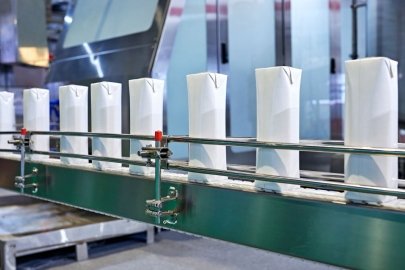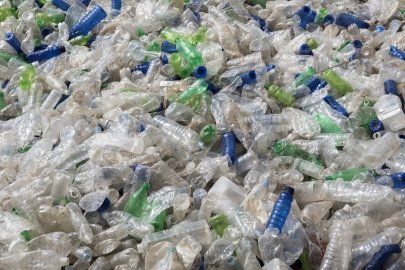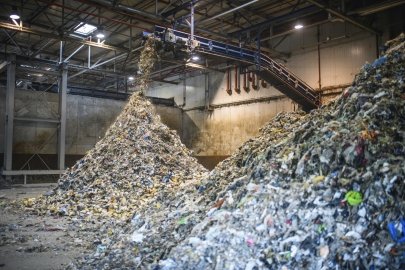About the Strategy for Plastics Innovation
The Strategy for Plastics Innovation (SPI) focuses on resources from across the U.S. Department of Energy to create a comprehensive program to accelerate innovations that will dramatically reduce plastic waste in oceans and landfills. This initiative will position the United States as a global leader in advanced plastics recycling technologies and in the manufacturing of new plastics that are recyclable by design.
SPI will draw on fundamental and applied research capabilities within national laboratories, universities, and industry.
SPI 2030 Vision, Mission, and Strategic Goals
The vision, mission, and strategic goals of the SPI are designed to position the United States as a leader in science and technology innovations needed to develop and manufacture new plastic technologies by 2030.
Vision
The United States leads the world in developing and deploying technologies that minimize plastic waste and promote energy-efficient and economical plastic and bioplastic design, production, reuse, and recycling.
Mission
To deliver transformative science and technology solutions that will reduce plastic waste and lower the energy impacts of plastic production and reuse.
Strategic Goals
- Deconstruction: Create new chemical, thermal, and biological/hybrid pathways to deconstruct plastics
efficiently into useful chemical intermediates. - Upcycling: Advance the scientific and technological foundations that will underpin new technologies for
upcycling chemical intermediates from plastic waste into high-value products. - Recyclable by Design: Design new and renewable plastics and bioplastics that have the properties of
today’s plastics, are easily upcycled, and can be manufactured at scale domestically. - Scale and Deploy: Support an energy- and material-efficient domestic plastics supply chain by helping
companies scale and deploy new technologies in domestic and global markets, while improving existing
recycling technologies such as collection, sorting, and mechanical recycling.
SPI Objectives and Metrics
The SPI has developed quantitative objectives and metrics to measure progress toward its strategic goals. These metrics will help to ensure that funding opportunities associated with the SPI are cost effective and clearly emphasize GHG emissions reduction, energy efficiency, carbon efficiency, and material retention.
- Develop technologies to address end-of-life fate for >90% of plastic materials.
- Provide ≥50% energy savings relative to virgin material production.
- Achieve ≥75% carbon utilization from waste plastics to encourage material-efficient processes.
- Design recycling strategies that mitigate ≥50% GHG emissions relative to virgin resin or plastic intermediate production.
- Develop recyclable-by-design plastic solutions and recycling processes that are cost-competitive with incumbent plastic materials and processes.
Recent News
-
 An R&D team is working to develop a process by which multilayer food packaging can be replaced by a single mono-material packaging solution.
An R&D team is working to develop a process by which multilayer food packaging can be replaced by a single mono-material packaging solution. -
Using machine learning, scientists discovered variants of 'plastic-eating' enzymes adapted to deconstructing all varieties of polyester.
-
 Moderate levels of ash do not significantly affect the mechanical properties of biocomposites.
Moderate levels of ash do not significantly affect the mechanical properties of biocomposites. -
 Manufacturing and recycling processes in a plastics circular economy can be configured to minimize energy consumption and greenhouse gas emissions.
Manufacturing and recycling processes in a plastics circular economy can be configured to minimize energy consumption and greenhouse gas emissions. -
The University of Wisconsin-Madison is part of a new $2.5 million grant from the U.S. Department of Energy to develop biodegradable polymers.
-
New ideas and innovations, such as chemical recycling and urban mining, may enable better recycling in the future.
-
 Manufacturing and recycling processes in a plastics circular economy can be configured to minimize energy consumption and greenhouse gas emissions.
Manufacturing and recycling processes in a plastics circular economy can be configured to minimize energy consumption and greenhouse gas emissions.
SPI is a U.S. Department of Energy-wide effort between the Office of Energy Efficiency and Renewable Energy (EERE), Office of Science, Advanced Research Projects Agency–Energy, and Office of Fossil Energy and Carbon Management. The effort is coordinated by EERE’s Bioenergy Technologies Office and Advanced Materials and Manufacturing Technologies Office.
Contact Us
The Office of Placeholder
Office of the Assistant Secretary
Energy Efficiency and Renewable Energy
Mail Stop EE-1
Department of Energy
Washington, DC 20585

